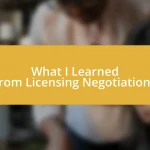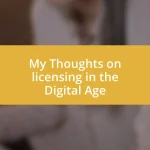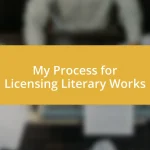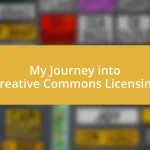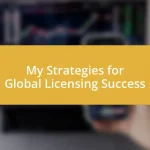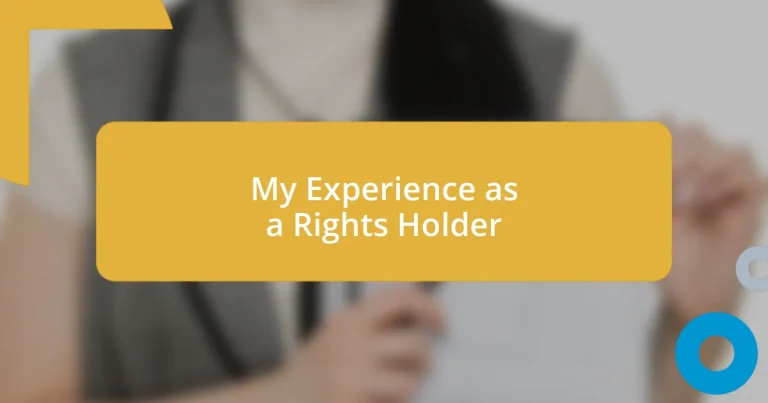Key takeaways:
- Empowerment through personal advocacy enriches rights holders’ experiences, fostering community solidarity and shared understanding.
- Effective stakeholder engagement hinges on genuine connection and transparency, which build trust and enable collaborative action.
- Emerging trends such as technology adoption, cross-organization collaboration, and data-driven approaches are transforming the advocacy landscape for rights holders.
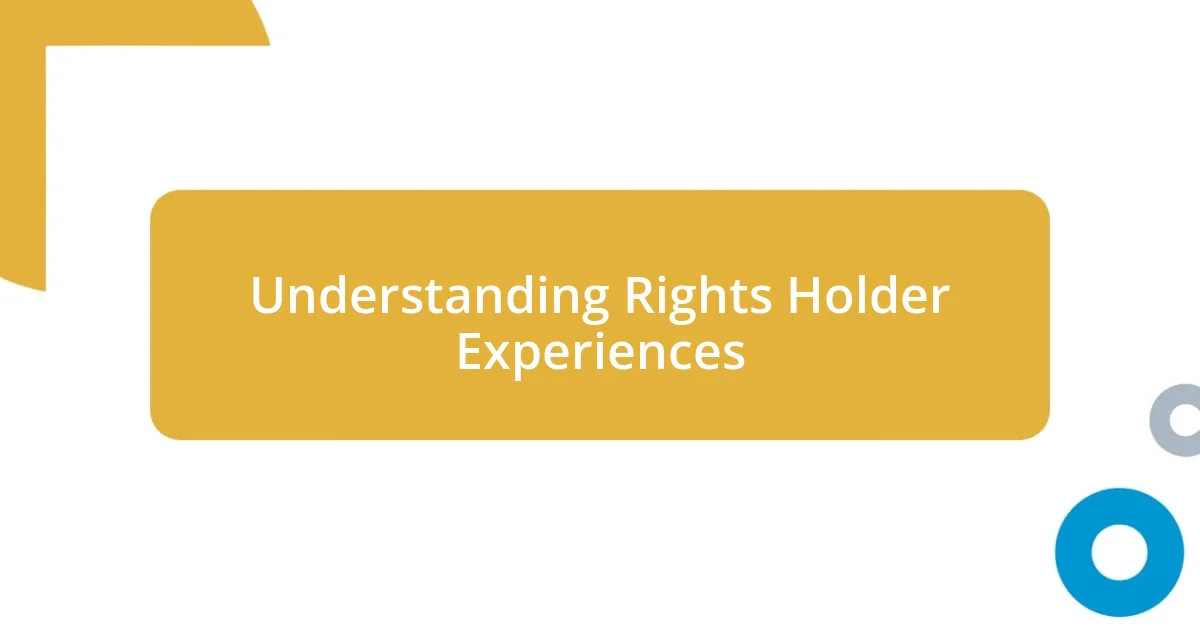
Understanding Rights Holder Experiences
Understanding the experiences of rights holders can be incredibly enlightening. I remember a time when I had to advocate for my own rights in a community setting. The feeling of empowerment was profound, yet it came with its own set of anxieties. Have you ever wondered how those moments shape our perceptions of justice and belonging?
As I navigated the complexities of asserting my rights, I found that the emotional landscape was just as vital as the legal one. The fear of being dismissed or misunderstood often loomed over me. It’s fascinating to think about how these feelings influence not just individual actions but also collective movements for rights.
Reflecting on these experiences, it becomes clear that rights holder journeys are often laden with both triumphs and struggles. Each story, including my own, offers a unique insight into the systemic barriers we face. How can we use these narratives to foster greater empathy and action in society? Through understanding and shared experiences, we can cultivate a community that truly values every voice.
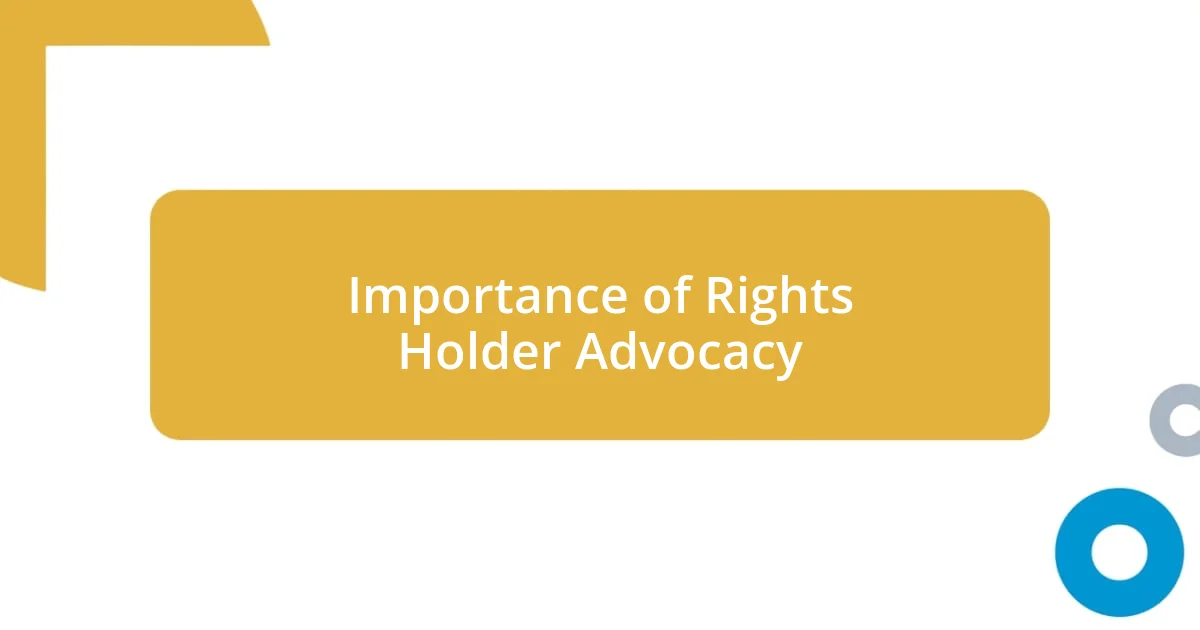
Importance of Rights Holder Advocacy
Advocacy for rights holders is not just about speaking up; it’s about creating a platform for voices that often go unheard. I remember attending a grassroots meeting where individuals came together to share their stories. The moment someone described feeling invisible in a room full of decision-makers, I felt this deep, shared frustration. It reinforced my belief that advocacy is essential in transforming personal narratives into collective strength, ensuring that everyone recognizes their inherent worth.
Here are a few key reasons why rights holder advocacy is crucial:
- Empowerment: Advocacy helps individuals recognize their rights and strengths.
- Visibility: It brings attention to marginalized voices, fostering inclusivity.
- Change: Expert advocacy can influence policies that protect and uphold rights.
- Support: A united front provides emotional and practical backing for those facing challenges.
- Awareness: It educates the broader community about rights-related issues and experiences.
When I’ve observed the power of collective action, it’s inspiring to see how advocacy can ignite change, shift mindsets, and instill hope. Each voice adds a vital note to the symphony of rights holder experiences, making the whole narrative richer and more profound.
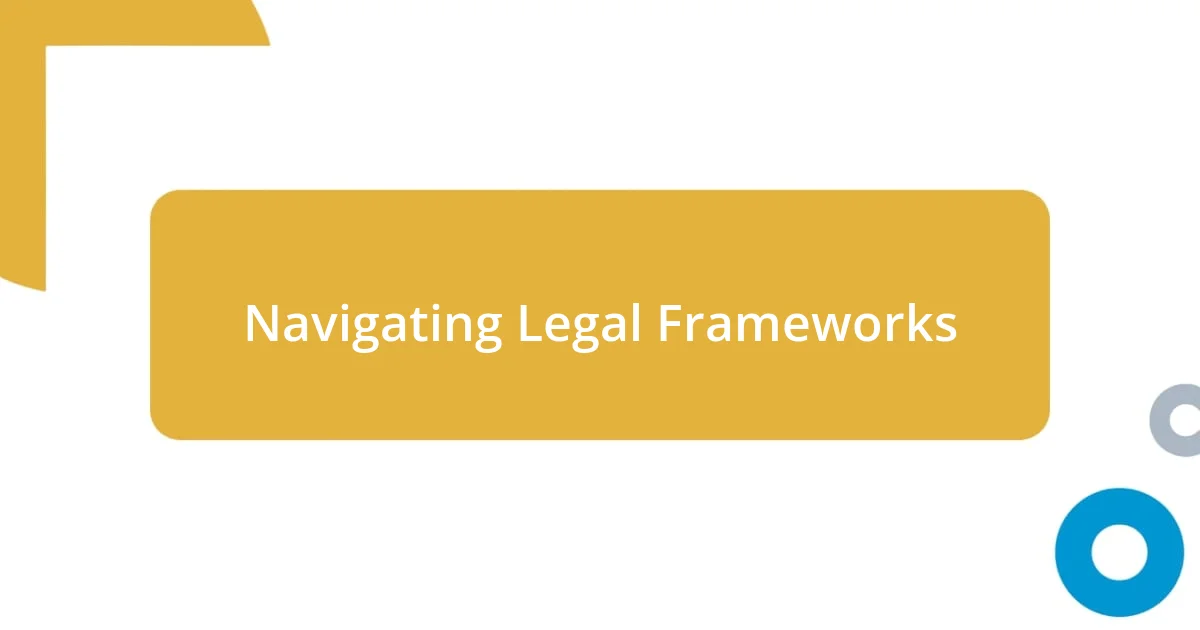
Navigating Legal Frameworks
Navigating legal frameworks can feel daunting, often resembling a labyrinth where the rules change at every turn. I remember my first encounter with legal jargon while trying to understand my rights—it was like deciphering a foreign language. This experience taught me the importance of breaking down legal concepts into digestible pieces. I realized that even small steps, like asking questions or seeking clarification, could empower me to make informed decisions.
As I delved deeper into legal resources, I discovered how essential it is to familiarize oneself with local laws and regulations. For instance, knowing the specific rights afforded to me in my jurisdiction made a remarkable difference in my confidence. It’s incredible how understanding these frameworks not only protects us but also reinforces our sense of belonging in society. Have you ever felt that surge of assurance when you finally grasp your rights?
Support systems often play a critical role in navigating legal frameworks. I recall reaching out to a community organization that provided legal resources and mentorship. Their guidance helped me navigate the paperwork and complicated terms that initially overwhelmed me, making the process feel less isolating. It’s worth considering how community support can bridge the gap and create a sense of solidarity for those facing similar challenges.
| Legal Aspect | Personal Experience |
|---|---|
| Understanding Rights | I struggled initially but learned to break down complex terminology. |
| Local Regulations | Familiarity with laws in my area instilled confidence. |
| Support Systems | A community organization provided guidance and resources that changed everything for me. |
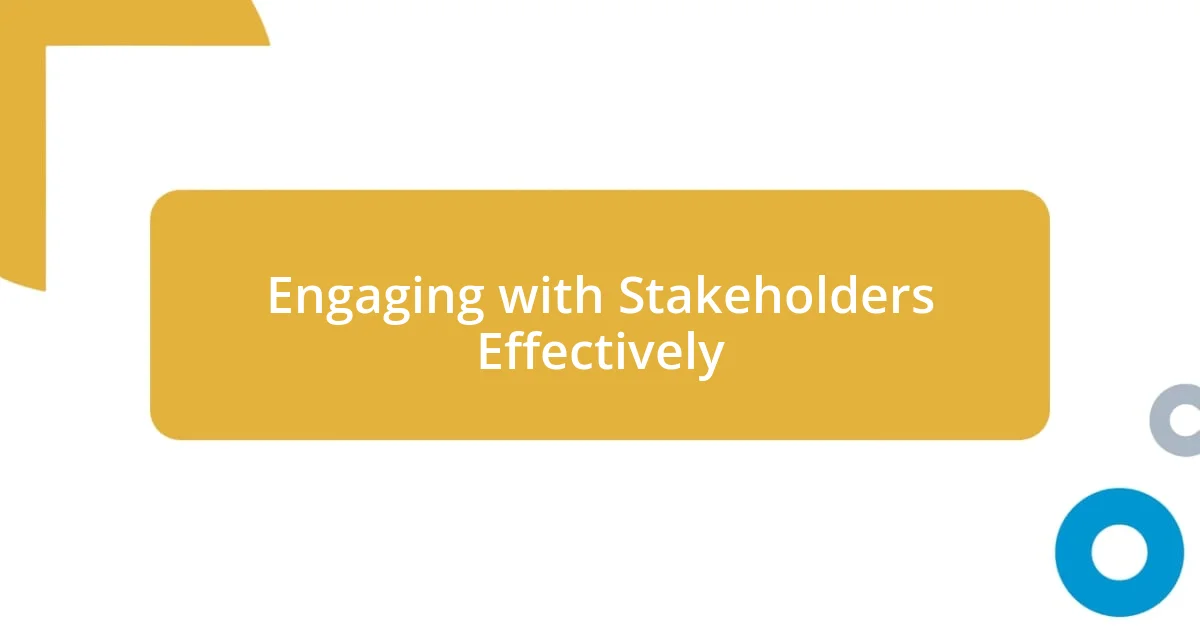
Engaging with Stakeholders Effectively
Effective engagement with stakeholders is vital in ensuring that the voices of rights holders are heard. One time, during a campaign launch, I reached out to local businesses and non-profits. We organized a roundtable discussion where each participant could share their perspectives. I was amazed at how open people were—just by creating a space for dialogue, there was an immediate sense of trust and collaboration.
I’ve discovered that the key to successful engagement lies in genuine connection. When I took the time to listen to stakeholders’ stories, I noticed that it transformed our interactions. It wasn’t just about data or statistics; it became a shared journey. Have you ever felt a stronger bond with someone after simply sharing a personal experience? This connection can be the driving force that motivates stakeholders to champion rights holder initiatives authentically.
Another crucial aspect of effective engagement is addressing stakeholders’ concerns directly. I vividly remember a meeting where community members expressed skepticism about the intentions of our project. Instead of brushing it off, I paused and encouraged an open dialogue about their fears. By validating their concerns and demonstrating that we were on the same side, we built a partnership based on mutual respect and understanding. It taught me that transparency not only alleviates doubts but also lays the groundwork for collaborative action.
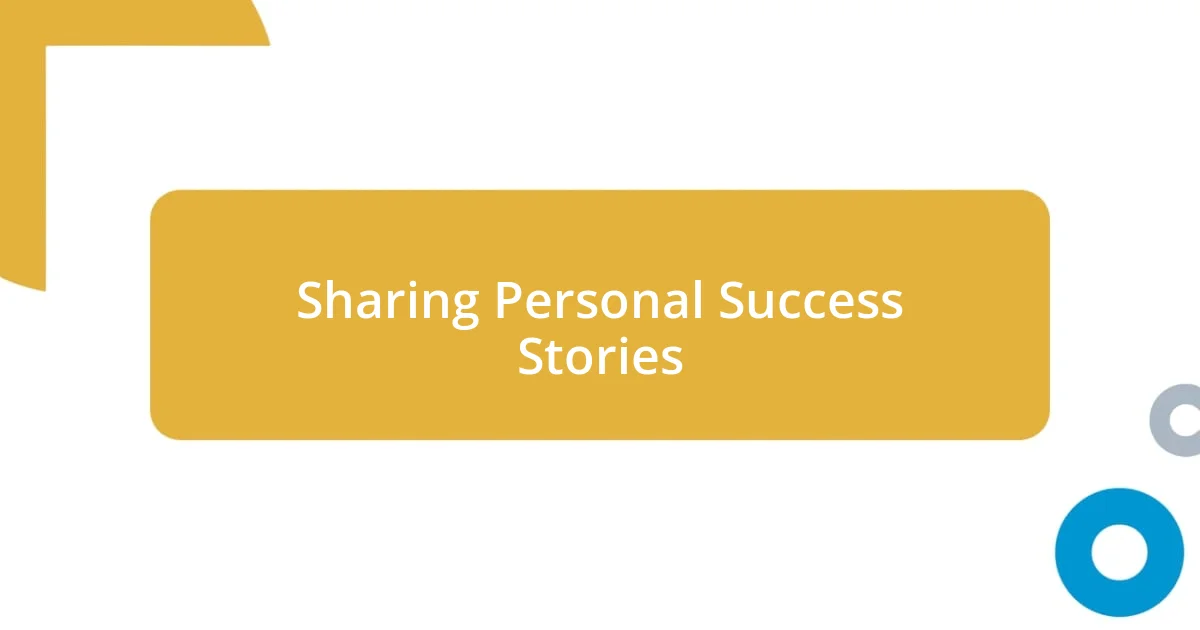
Sharing Personal Success Stories
Sharing personal success stories often serves as a beacon of hope and inspiration for others navigating similar challenges. I vividly recall a moment when I successfully advocated for my rights in a local meeting. The thrill of speaking up, coupled with the empathetic nods from the audience, made me realize how powerful sharing our journeys can be. Have you ever felt that spark of courage after witnessing someone else’s story?
One of my most rewarding experiences was when I organized a community gathering to share stories of overcoming obstacles in asserting our rights. As individuals began to speak one by one, the room filled with a palpable sense of unity and passion. It was remarkable to see how vulnerable sharing these experiences created a safe space for others to open up. I could see some faces light up with relief, realizing they were not alone in their struggles. Isn’t that an extraordinary feeling?
I’ve learned that personal success stories are not just about triumph; they are also about honesty and learning. After sharing my own stumbling blocks alongside victories, attendees often expressed their gratitude for normalizing difficult conversations. By embracing both our successes and failures, we empower each other and foster a deeper sense of resilience within our community. How might your own story inspire someone else to navigate their journey?
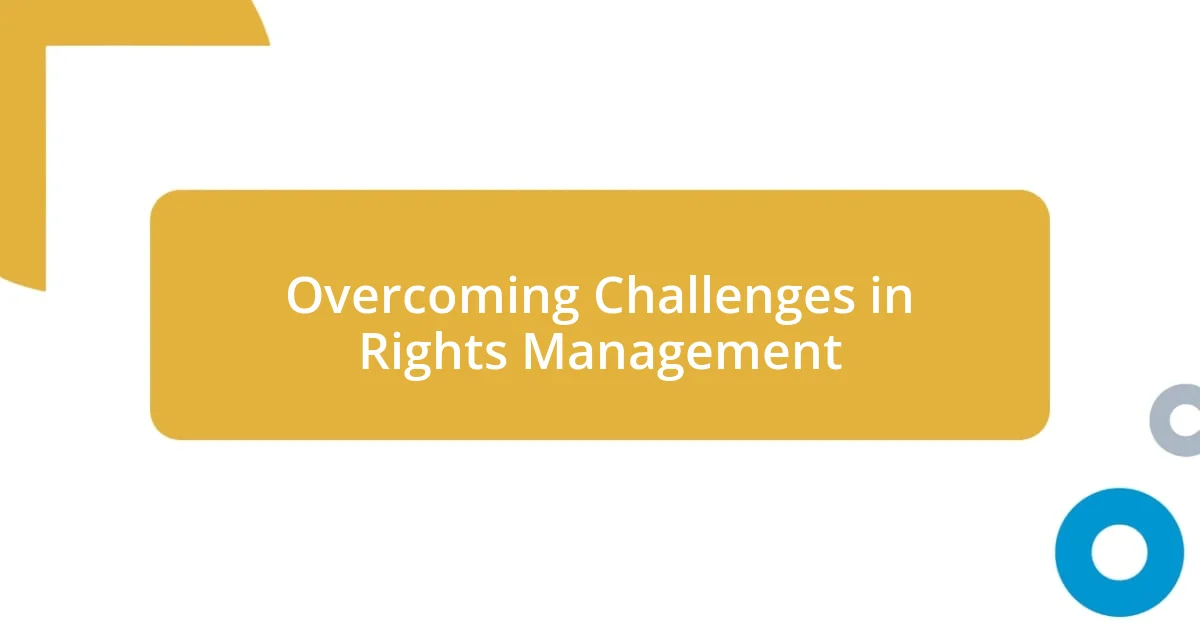
Overcoming Challenges in Rights Management
Overcoming challenges in rights management often requires a nuanced approach. I faced a significant hurdle when I realized that legal jargon could alienate the very people we were trying to support. During one workshop, I took a moment to simplify complex terms into everyday language. The gratitude expressed by participants was palpable; suddenly, they felt empowered instead of overwhelmed. Have you noticed how clarity can bridge gaps in understanding?
Another challenge I encountered was the resistance to change from established entities. I vividly recall presenting our rights framework to a local government body that was skeptical about our objectives. Instead of getting defensive, I engaged them in a discussion about their concerns, focusing on how our goals aligned with their mission. This openness transformed our approach, fostering a cooperative atmosphere. It made me realize that change is often a product of building trust, don’t you think?
Lastly, navigating cultural sensitivities requires a delicate balance. I once worked with a diverse group where cultural norms varied significantly. By taking the time to learn about those norms, I crafted our initiatives to respect and reflect those values. I’ll never forget the moment when community members shared their traditions tied to rights awareness—it lit a spark of enthusiasm that reinforced our collective mission. Have you ever experienced the power of cultural connection in your own advocacy work?
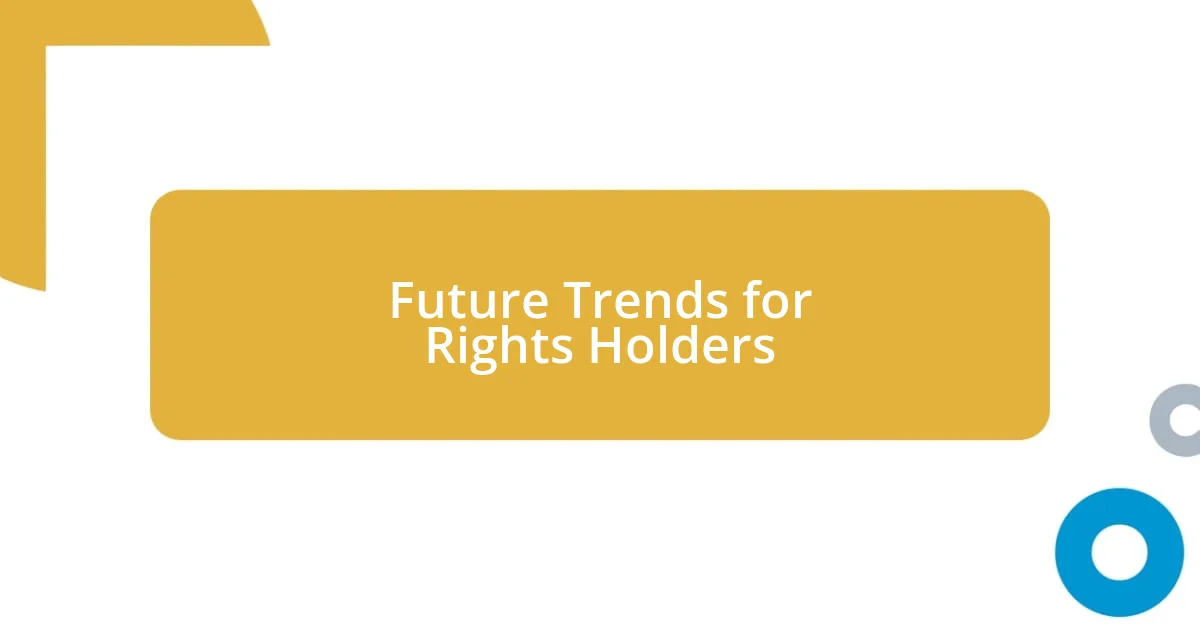
Future Trends for Rights Holders
As I look ahead, I see a growing trend where rights holders are increasingly harnessing technology to amplify their voices. I remember a workshop where participants used social media to share their rights stories. The impact was immediate; not only did attendees find solidarity online, but they also gained national attention that sparked broader conversations. Have you ever wondered how digital platforms could reshape the landscape of advocacy?
Moreover, I notice a shift towards collaboration among various rights holders. When I joined a coalition meeting, I was surprised by how many organizations were willing to pool resources and strategies. This kind of collaboration not only strengthens our collective power but also enhances visibility for our causes. It’s fascinating to think about the creative solutions we can develop together. How might your organization benefit from joining forces with others?
Lastly, the emergence of data-driven approaches in advocacy is changing the game. During a recent project, I worked with a team that utilized statistical analyses to present compelling evidence for our rights claims. It was eye-opening to see how numbers could evoke empathy and prompt action from decision-makers. Isn’t it amazing to think about how data can add weight to the narratives we share and the rights we advocate for?


